
by Deep Green Resistance News Service | Aug 26, 2012 | Colonialism & Conquest, Indigenous Autonomy, Obstruction & Occupation
By J. G. / Deep Green Resistance Great Plains
Women of the Oglala Lakota nation along with activists from Deep Green Resistance, AIM Grassroots, Native Youth Movement, Un-Occupy Albuquerque, Occupy Lincoln, and Rocky Mountain Peace and Justice Center took part in a march from Billy Mills Hall in Pine Ridge into Whiteclay to protest against the predatory liquor industry present there.
Whiteclay has a population of 14, yet 4 liquor stores in the town sell 12,500 cans of beer each day. The stores have been documented repeatedly selling to bootleggers, intoxicated people, minors, and trading beer for sexual favors.
“For over 100 years the women of the Oglala Lakota nation have been dealing with an attack on the mind body and spirit of their relatives”, says Olowan Martinez who is a main organizer of the event and resident of Pine Ridge. “The Oglala have been silenced through chemical warfare waged by the corporations who are out to exploit and make a profit off of the suffering and misery of our people. The time has come to end this suffering by any means necessary.”
Debra White Plume, a Lakota activist and resident of Pine Ridge who spoke at the event proclaimed, “A sober Indian is a dangerous Indian. We have to send a message to Nebraska and its citizens that we are not going to tolerate business as usual. This is the Women’s Day of Peace but that peace will soon be over”.
After the march and speeches members of Deep Green Resistance locked down and blockaded the road into Whiteclay.
Less than a half hour after the lockdown began a police officer rolled down their window and indiscriminately pepper sprayed into a crowd. Up to 12 people were pepper sprayed including the 10 year old son of a Lakota woman who helped organize the march. Also, an elder Lakota woman, Helen Red Feather, reported having her leg hit by a police car in motion. Medics with the protest treated pepper spray injuries.
At 7:39, the five activists who participated in the lock down were hauled off in a horse trailer to the Sheridan County jail in Rushville. They have since been released on their own recognizance.
Today, justice is far from complete, since Whiteclay continues to enable and enact the destruction of the Oglala Lakota and the people of Pine Ridge. The continued subjugation of the Oglala Lakota of the Pine Ridge Reservation will not end as long as the liquor stores in Whiteclay continue to operate.
Chants of “As long as it takes!” began by those locked down and the people standing with them in the crowd at the beginning of the lockdown. The struggle continues.
For context behind the Women’s March and Day of Peace, as well as pictures from the action, please see http://dgrnewsservice.org/2012/08/26/womens-day-of-peace-action-in-white-clay/
Want to help support this action? Please see http://deepgreenresistance.org/feature-help-support-indigenous-solidarity-in-whiteclay/
Para leer este articulo en español, vea: http://dgrnewsservice.org/2012/08/29/la-marcha-de-mujeres-y-el-dia-de-paz-resulto-ser-violente-manifestantes-detenidos/
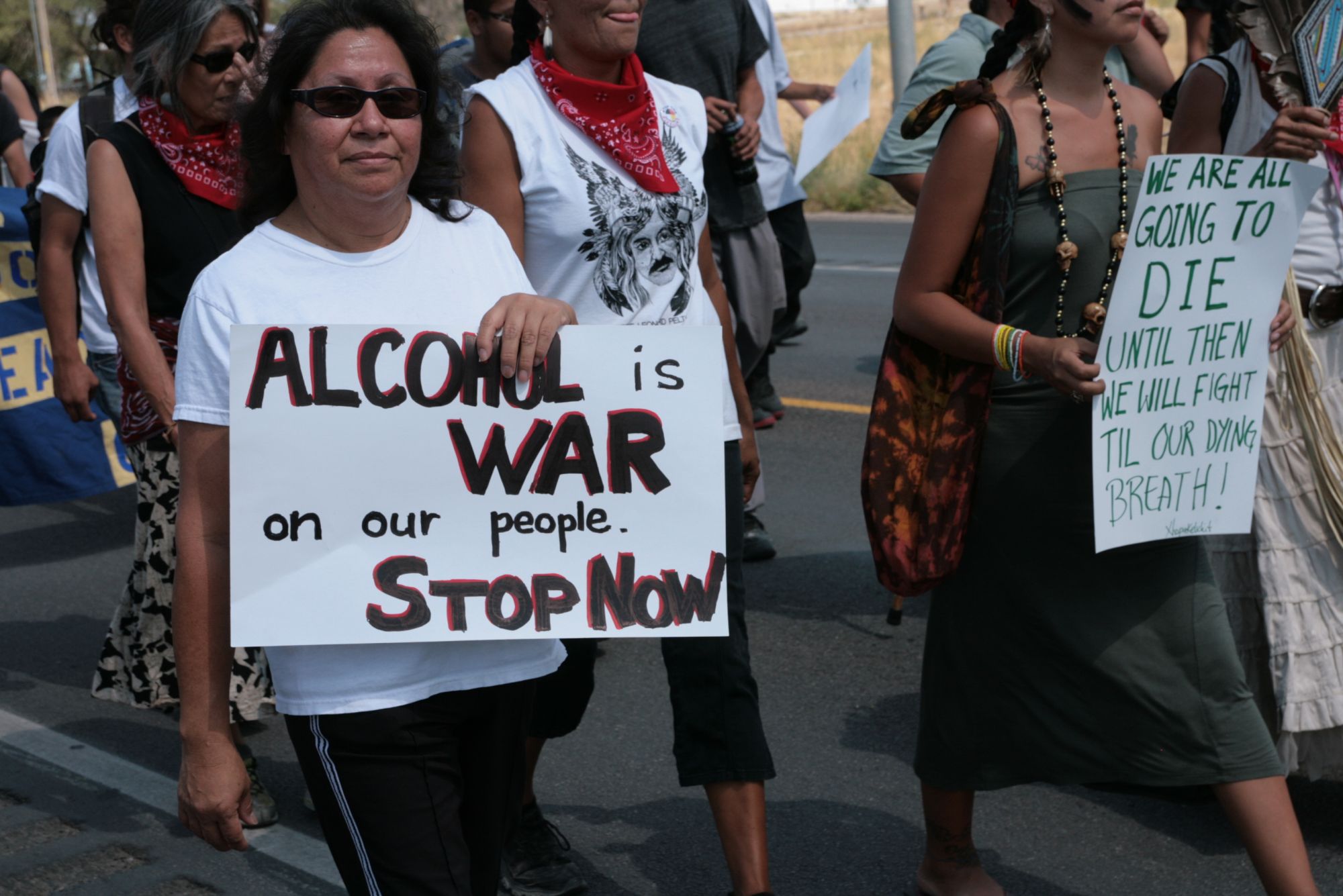
by Deep Green Resistance News Service | Aug 26, 2012 | Colonialism & Conquest, Indigenous Autonomy, Obstruction & Occupation
Whiteclay is an unincorporated village with a population of 14 people in northwest Nebraska. The town sits on the border of the Pine Ridge Indian Reservation, home to the Oglala Lakota (also known as the Oglala Sioux Tribe).
Whiteclay lies on disputed land, merely 200 feet from the official reservation border and less than 3 miles from the center of Pine Ridge, South Dakota, the largest town on the reservation.
Sale and possession of alcoholic beverages on the Pine Ridge is prohibited under tribal law. Except for a brief experiment with on-reservation liquor sales in the early 1970s, this prohibition has been in effect since the reservation lands were created.
Whiteclay has four off-sale beer stores licensed by the State of Nebraska which sell the equivalent of 4.5 million 12-ounce cans of beer annually (12,500 cans per day), mostly to the Oglalas living on Pine Ridge. These retailers routinely violate Nebraska liquor law by selling beer to minors and intoxicated persons, knowingly selling to bootleggers who resell the beer on the reservation, permitting on-premise consumption of beer in violation of restrictions placed on off-sale-only licenses, and exchanging beer for sexual favors. The vast majority of those who purchase beer in Whiteclay have in fact no legal place to consume it, since possession and consumption of alcoholic beverages on the Pine Ridge Reservation remain illegal under tribal law. Many people have died in the streets due to exposure, as the state of Nebraska fails to uphold state law or police Whiteclay. As long as the liquor stores in Whiteclay remains in business, the genocide of the Oglala Lakota people will continue.
Tribal activists of the Strong Heart Warrior Society have conducted annual blockades since 1999, trying to intercept alcohol and drugs being brought into the reservation. In June 2006 tribal activists protested beer sales by blockading the road from Pine Ridge to Whiteclay and confiscating beer bought in Whiteclay. These activists hoped to prevent bootlegging and illegal sales on the reservation. On June 9th of this year, young Lakota activists and their non-native allies held a blockade of the highway leading into Whiteclay, and gained concessions from law enforcement.
In solidarity with the Oglala Lakota people, members of Deep Green Resistance are assisting an action now to shut down the bars in Whiteclay forever.
Updates on action:
Sun. August 26, 2012 (All times MDT)
As of 10:00 PM: Police and firefighters unable to unlock the blockaders once at the jail. The five released without bail after agreeing to unlock themselves.
7:59 PM: Tribal police have come into Nebraska to block support to the folks on lockdown. Nebraska State Patrol has brought in a trailer and carried the lockdown, as a unit, onto the trailer (one person may have sustained injuries due to this police maneuver). They are now being transported to the jail. They are still locked together. Stay tuned for updates on the protestors’ status and information on how to help!
6:22 PM: Police are bringing in a livestock trailer to attempt to move the blockade as a unit to a different location. They have threatened the blockaders with felony charges. Blockaders have decided to hold their ground. This is what resistance looks like.
5:30 PM: Police have threatened to arrest another protester.
4:20 PM: There’s a line of cops, a line of warriors, and a line of blockaders. There’s a huge banner that says “Honor the Treaties”. Lakota people are chanting and drumming.
4:00 PM: All four bars in Whiteclay have been shut down. Two arrests have been made. Police have issued an ultimatum that all those locked down in Whiteclay must walk back to the reservation or they will be arrested.



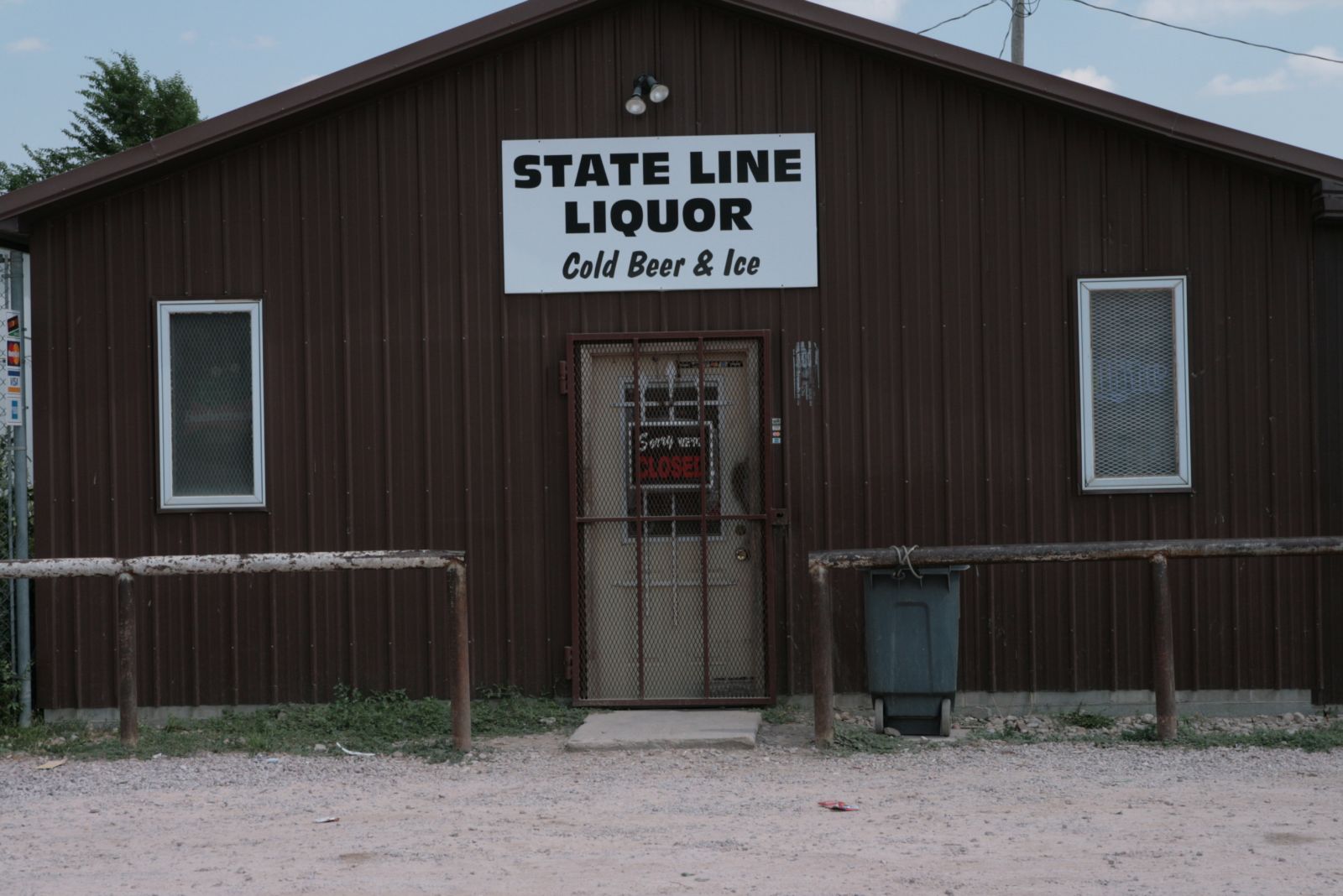
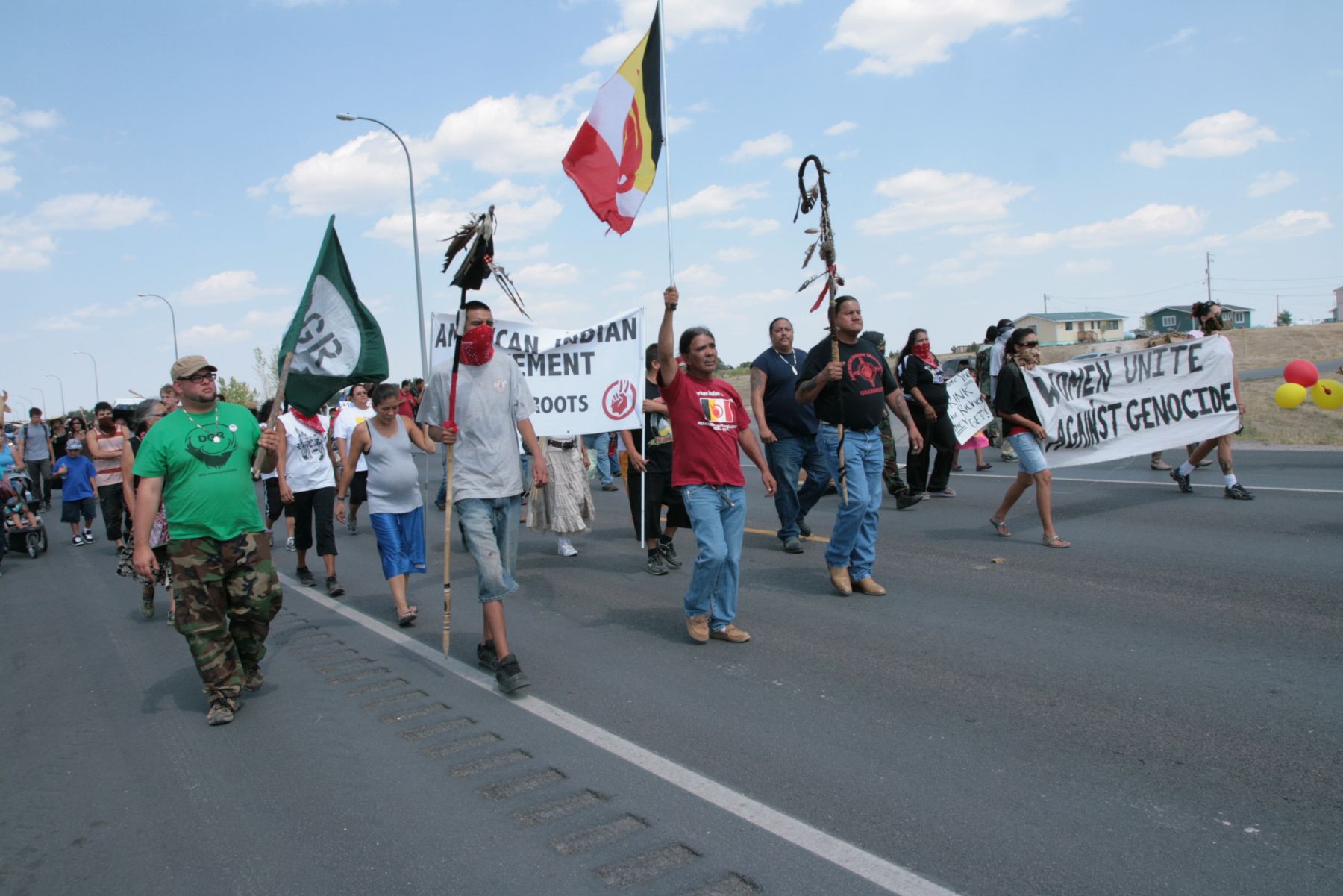

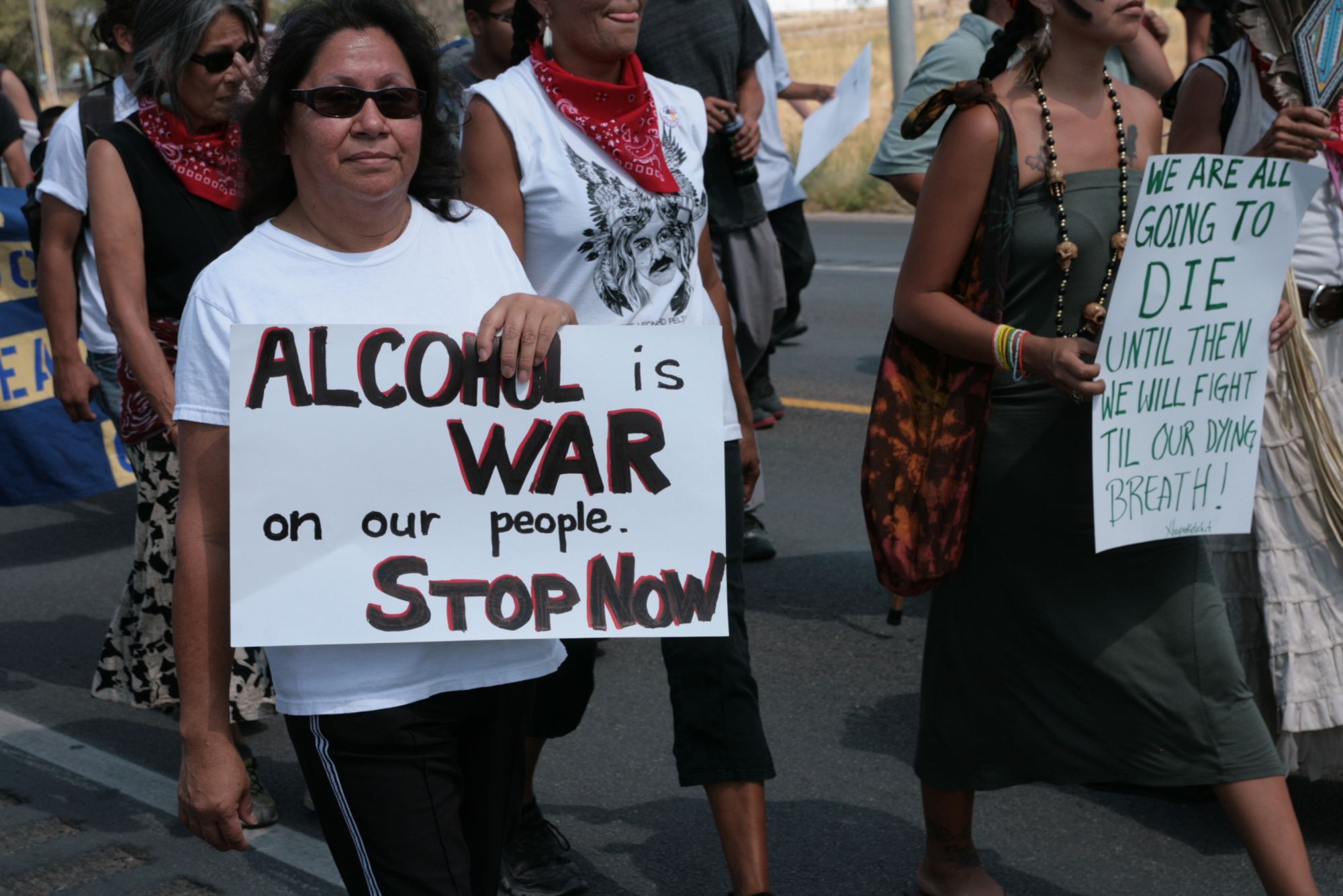
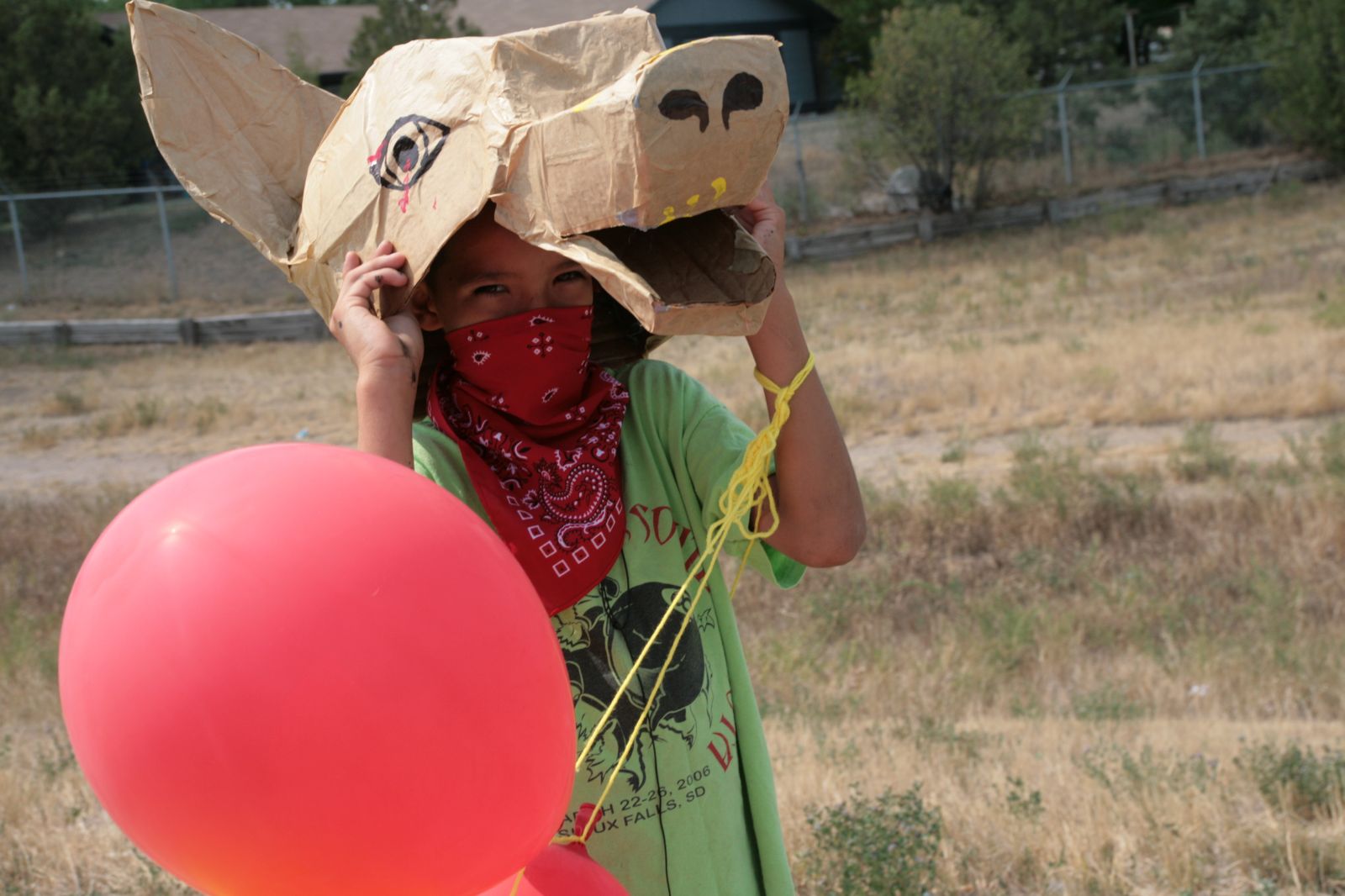
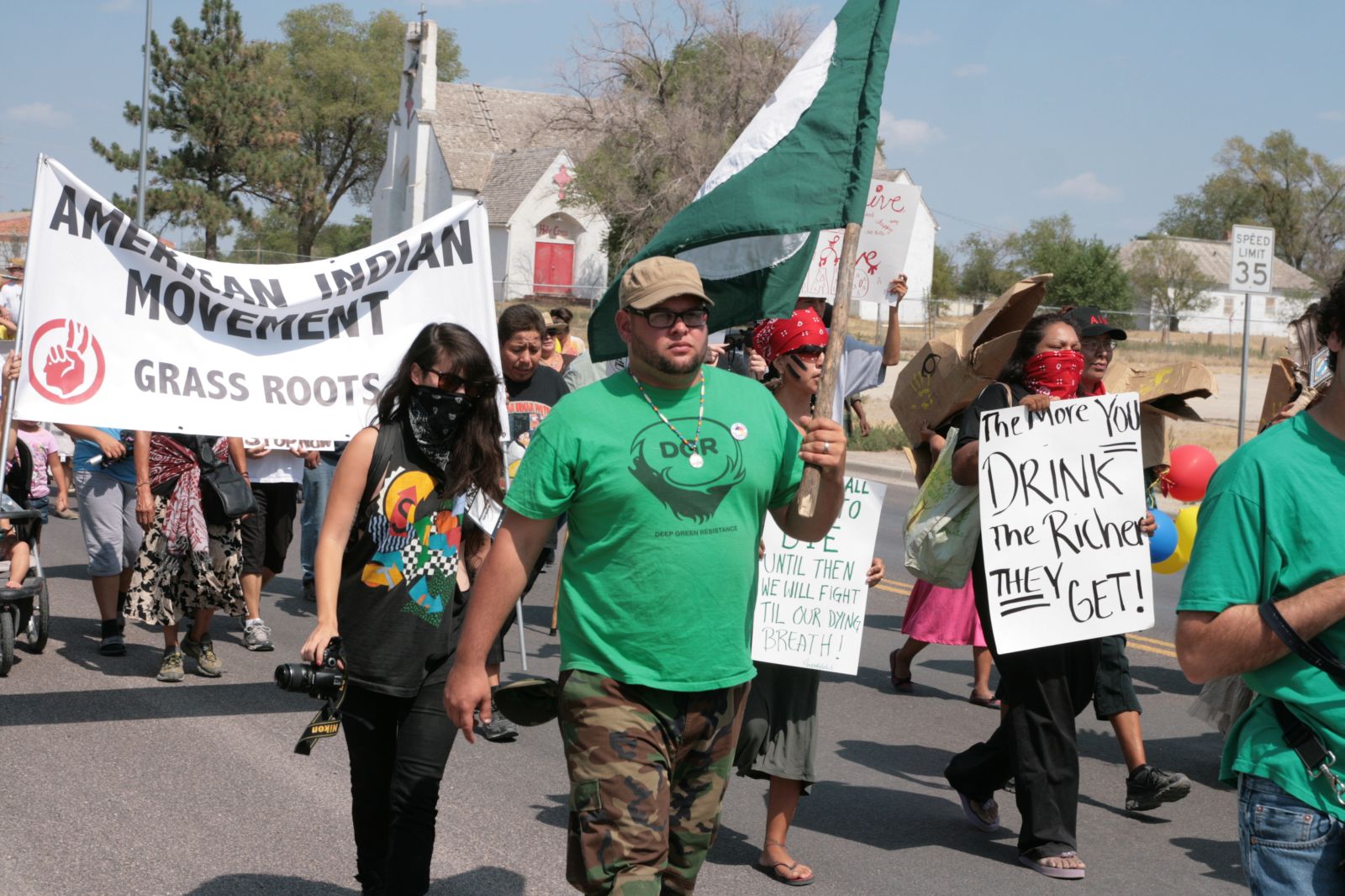
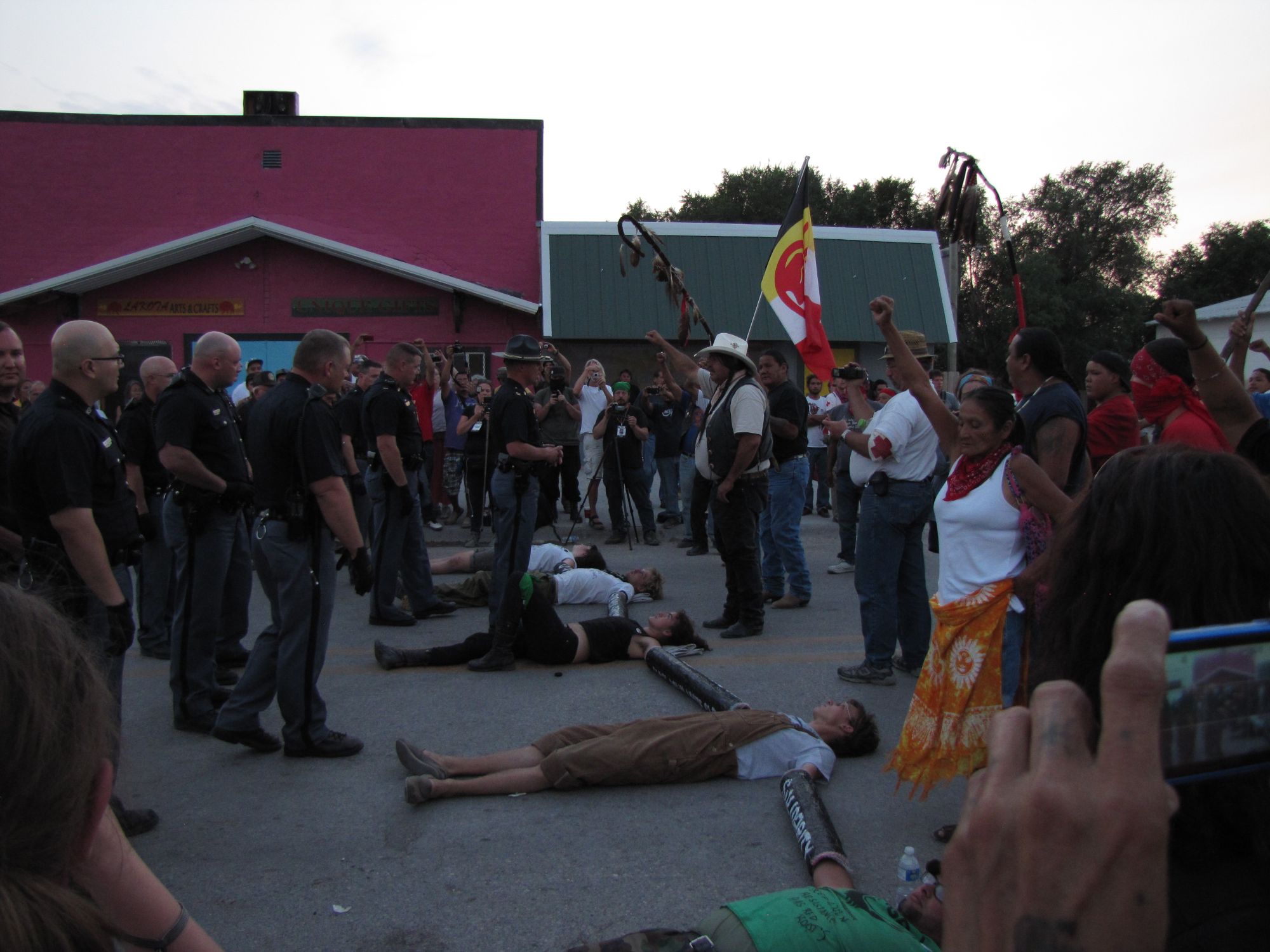

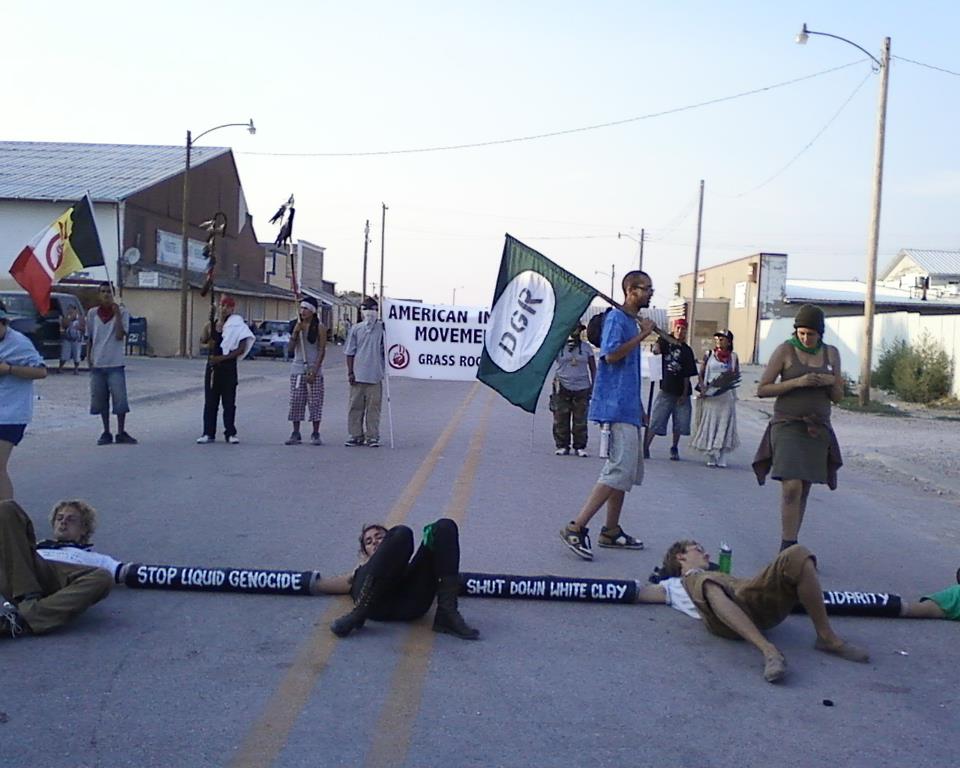
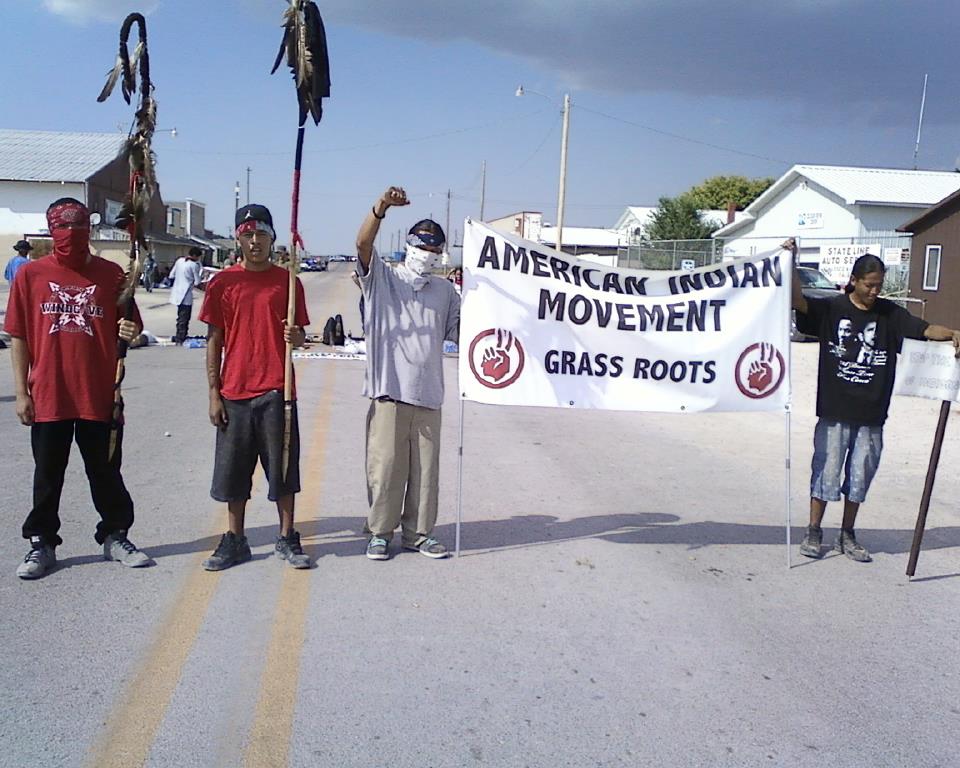




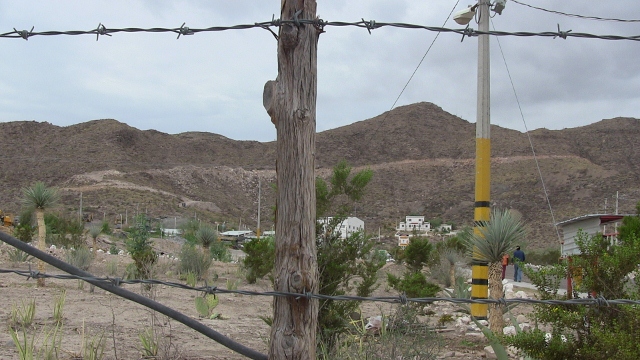
by Deep Green Resistance News Service | Aug 22, 2012 | Mining & Drilling, Obstruction & Occupation, Worker Exploitation
By Paul Bocking / Waging Nonviolence
Civil disobedience has halted production at Mexico’s “top grade producer of silver.” Farmers of the La Sierrita village, a close knit community of about 50 families, located 40 minutes north of the city of Gomez Palacio, Durango, have shut down the La Platosa mine owned by Canadian firm Excellon Resources for over a month.
This comes in response to the company’s refusal to negotiate with the community over its requests for the preferential hiring of local people on whose land the company operates, as well as pay the rental rates for its use. Labor conditions within the underground mine where many local residents work is also an issue. Dozens of community members have maintained a nonviolent blockade of the one road into the mine, allowing only essential maintenance workers to pass, resulting in extraction grinding to a halt.
In recent years mining operations have drawn local protests from Peru to Tanzania and Papua New Guinea. Mexico is the site of several high profile struggles, nearly all involving Canadian companies. Communities are opposing the loss of their land and its contamination with toxins, including arsenic and cyanide, which are used in abundance in the extraction of gold.
Unlike many of these conflicts, the residents of La Sierrita have succeeded in inflicting a substantial economic cost to the company. As in the case of an effective strike, it is hoped that the continued shut down of its sole mining operation will eventually force Excellon to yield. Along with the community’s unified resolve to maintain the blockade, what distinguishes this struggle is that so far, it has succeeded in effectively disrupting the mine without triggering violent repression from the Mexican government or the company.
Many human rights activists are accustomed to campaigning against U.S.-based transnational corporations, which continue to dominate many sectors, but in the particularly violent, exploitative and dirty world of resource extraction, Canadian corporations are among the worst culprits. Since the mid-1990s, the Canadian-based mining sector has emerged to become the biggest in the world. The Toronto Stock Exchange is now the principal source of finance capital for mining operations. In 2010, Canadian mining companies held assets worth $129 billion internationally, with 90 percent owned by the 70 largest firms. Mexico is the second biggest country for Canadian overseas mining operations. With five mines, Goldcorp has the largest Canadian corporate presence in Mexico. Goldcorp also owns the infamous Marlin mine in Guatemala, where the company has been implicated in the deaths of human rights activists protesting its incursion into traditional indigenous territories.
Read more from Waging Nonviolence: http://wagingnonviolence.org/2012/08/no-silver-medal-mexican-farmers-battle-canadian-mine-for-control-of-their-land/
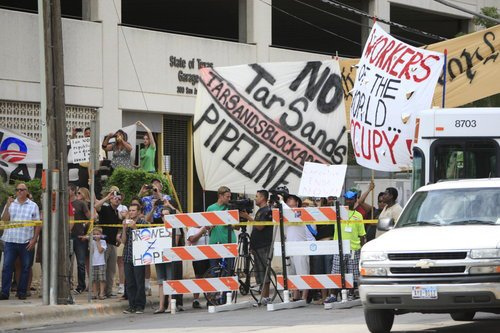
by Deep Green Resistance News Service | Aug 15, 2012 | Climate Change, Obstruction & Occupation
By Will Wooten / Waging Nonviolence
One year after more than 1,200 people were arrested in front of the White House during two weeks of sit-ins against the Keystone XL tar sands oil pipeline, a coalition of Texas landowners and activists will attempt to physically halt its construction. Led by veteran climate justice organizers, participants ranging from environmentalists to Tea Partiers are preparing to lock arms for a sustained nonviolent civil disobedience campaign, beginning perhaps as early as this week.
The impetus for such action, which is being called the Tar Sands Blockade, goes back much further than last summer, however. In 2008 and 2009, small landowners along the pipeline’s route in rural Texas, Oklahoma and Nebraska started noticing survey stakes with orange tape marked “KXL.” They soon found out that TransCanada — the company building the pipeline — had eminent domain power over their property and that if they didn’t sign a contract allowing TransCanada to build, they would be taken to court.
Many landowners, feeling pushed into an impossible situation, signed the contracts. Some began organizing, doing community outreach to explain what was happening and building conservative support on the ground. Organizations such as Nacogdoches Stop Tarsands Oil Pipelines evolved out of conversations between landowners — first focusing around eminent domain, but then, when they learned that tar sands oil would be pumped through the pipeline, discussion started to include environmental impacts, such as toxic diluted bitumen and climate change.
By August 2011, the climate movement in the United States started to focus in on the Keystone XL with Tar Sands Action, a civil disobedience campaign led by Bill McKibben and members of 350.org. The 1,253 arrests in front of the White House helped raise the issue to a national level by stressing that President Obama could stop the pipeline by rejecting its permit to cross the U.S.–Canada border.
Weeks later, the Occupy movement emerged. While environmental issues were not at the forefront, many Occupy encampments passed resolutions opposing Keystone XL and took part in Tar Sands Action’s next rally in Washington, D.C., when, on November 6, 12,000 people encircled the White House. Days later President Obama denied the permit and, for the moment, Keystone XL was thought dead.
TransCanada then changed tactics and decided to split the pipeline into segments so that it could get a head start on construction while making inside deals in Washington to secure the necessary permit for crossing the border. In a sign of goodwill to the fossil fuel industry, President Obama went to Cushing, Oklahoma, and declared that he would “expedite” the permitting process for the Gulf Coast segment from Cushing to Houston and Port Arthur, Texas. While that ability was technically outside of his reach, it was a hint to the agencies responsible for such decisions. Perhaps not surprisingly, the Army Corps of Engineers then granted the three permits TransCanada needed to start construction — despite the absence of an environmental review.
The southern segment of the Keystone XL will be built in three different sections, simultaneously, with the goal of transporting tar sands oil currently stored in Cushing, Oklahoma, to refineries on the Gulf Coast, where it then can be shipped around the world. When Texas activists such as myself learned that this was happening despite the Tar Sands Action victory, we decided to form Tar Sands Blockade.
While landowners began organizing along the pipeline route in early 2012, climate justice activists with Rising Tide North Texas were looking for ways to bring wider attention to the pipeline’s impending construction. Many of us had been active Occupiers during the encampments and were disappointed with the movement’s inability to make the connection between economic justice and the climate. So we made a stronger effort to engage people on the community level.
As a result, Tar Sands Blockade is being informed by a variety of voices — from self-identified Tea Party members, flying Gadsden flags at the front of their long driveways, to Occupiers who slept at encampments across the country.
Several organizers with Tar Sands Blockade also participated in and organized for Tar Sands Action, including veteran climate justice activists from around the country. This diverse coalition has agreed on one simple call to action: The Keystone XL should not be built in Texas, and nonviolent direct action is required to stop it.
Other means of addressing the grievances of landowners and meeting the challenge of climate change have thus far failed. As Bill McKibben’s recent article “Global Warming’s Terrible New Math” made clear, the world has years, not decades, to confront the fossil fuel industry head on. Nonviolent direct action offers the best chance of victory, not just for the Tar Sands Blockade but for other fossil fuel extraction movements, such as those opposing fracking, mountaintop removal and coal exports — all of which have been active in what’s being called a Climate Summer of Solidarity.
That solidarity will take on greater meaning in a matter of days when construction on the pipeline is expected to begin and landowners will be bringing ice to the encampments to help alleviate the extreme Texas heat, as well as thanking everyone for defending the home they’ve built over decades. Activists will respond by holding the blockade for as long as possible, through the summer and likely into the fall. This could be an important moment for the entire climate movement, setting the stage for future actions and alliances — not to mention giving new meaning to the words “Don’t mess with Texas.”
From Waging Nonviolence: http://wagingnonviolence.org/2012/08/dont-mess-with-texas-tar-sands-blockade/
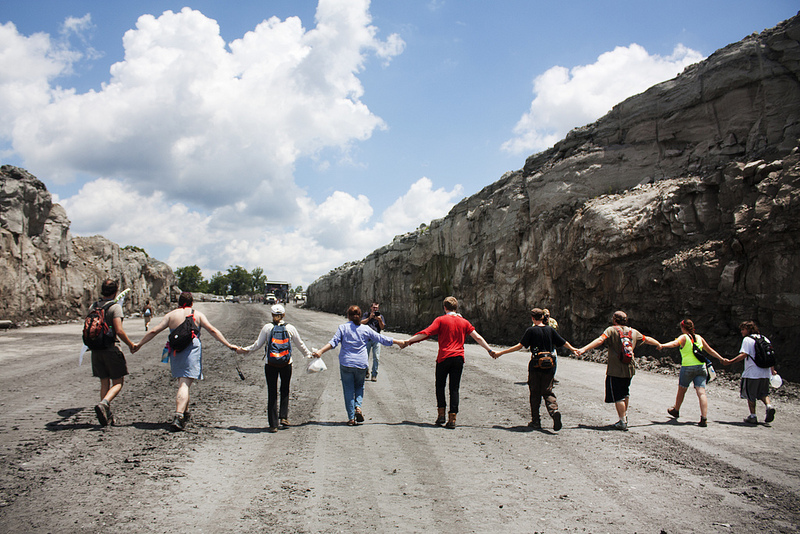
by Deep Green Resistance News Service | Jul 29, 2012 | Mining & Drilling, Obstruction & Occupation, Worker Exploitation
By Charles Suggs, RAMPS organizer
More than 50 protesters affiliated with the R.A.M.P.S. Campaign have walked onto Patriot Coal’s Hobet mine and shut it down. Ten people locked to a rock truck, boarded it and dropped banners: ”Coal Leaves, Cancer Stays.” At least three have been arrested, with another in a tree being threatened by miners with a chain saw. Earlier in the day, two people were arrested at Kanawha State Forest before a group of protesters headed to the state capitol.
“The government has aided and abetted the coal industry in evading environmental and mine safety regulations. We are here today to demand that the government and coal industry end strip mining, repay their debt to Appalachia, and secure a just transition for this region,” Dustin Steele of Matewan, W.Va. said. Steele was one of the people locked to the rock truck.
Mounting scientific evidence shows that strip mining negatively impacts community health and miner health. Recent studies have found a 42 percent increase in risk of birth defects around strip mines, and miners who spend at least 20 years as strip-mine drillers have a 61 percent chance of contracting silicosis, a virulent form of black lung. “The coal companies are poisoning our water and air, and they’re treating the workers no better than the land – fighting workplace health and safety protections to get the most out of labor as they can,” said Junior Walk of Whitesville, W.Va.
As coal production declines, protesters are concerned that the region will be left with only illness and environmental devastation as the industry pulls out of the region and companies file for bankruptcy to shed legacy costs.
Patriot Coal is currently going through Chapter 11 bankruptcy, in which union contracts and pensions could be on the chopping block. Both UMWA pensions and the state’s Special Reclamation Fund are funded through a per-ton tax on coal. With Central Appalachian coal production in the middle of a projected six-year, 50 percent decline, this funding stream is increasingly unsustainable. Protesters are calling on the coal industry and government to ensure that funding is available both to honor commitments to retired workers and to restore the land.
“Coal companies must employ their surface mine workers in reclaiming all disturbed land to the highest standards. Instead of arguing about the ‘war on coal,’ political leaders should immediately allocate funds to retrain and re-employ laid off miners to secure a healthy future for the families of this region,” said R.A.M.P.S. spokesperson Mathew Louis-Rosenberg.
Appalachian communities, from union miners to the anti-strip mining activists of the 1960s, have a proud history of confronting the coal industry and demanding an end to its exploitive practices with direct civil disobedience. R.A.M.P.S. and other campaigns have returned to this tradition to eliminate strip mining once and for all. Since its founding in 2011, R.A.M.P.S. has organized a range of actions, from tree-sits to blockades of coal trucks.
Today’s protesters are among the hundreds of people across the country who are joining this summer’s National Uprising Against Extraction, using radical tactics to fight oppressive extractive industries and demand a transition to a sustainable economy.
From We Are Power Shift:
You can help support RAMPS by making a donation here: https://www.wepay.com/donate/57022?ref=widget&utm_medium=widget&utm_campaign=donation

by Deep Green Resistance News Service | Jul 28, 2012 | Defensive Violence, NEWS, Obstruction & Occupation, Property & Material Destruction, Toxification
By Shiv Malik for The Guardian
Officials in eastern China have cancelled a planned industrial waste pipeline project after up to 1,000 environmental demonstrators occupied a government office, overturned cars, destroyed computers and beat police officers.
The demonstration in the city of Qidong was the latest in a string of protests sparked by fears of environmental degradation.
Zhang Guohua, mayor of the eastern city of Nantong, announced the cancellation of the pipeline, which would have emptied waste water from a Japanese-owned paper factory via the coastal town of Qidong into the sea. It is the second industrial project to be cancelled in a month.
The decision came hours after about 1,000 protesters marched through the city of Qidong, about one hour north of Shanghai, shouting slogans against the pipeline.
Several protesters entered the city government’s main building and were seen smashing computers, overturning desks and throwing documents out of the windows to loud cheers from the crowd. Five cars and one minibus were also upended, according to Reuters reporters at the scene.
At least two police officers were dragged into the crowd at the government office and punched and beaten bloody.
Environmental worries have stoked calls for expanded rights for citizens and greater consultation in the tightly controlled one-party state and come before a once-in-a-decade leadership transition this year.
The protest followed similar demonstrations against projects in the Sichuan town of Shifang earlier this month and in the cities of Dalian in the north-east and Haimen in southern Guangdong province in the past year.
The government in Shifang halted a multimillion-pound copper alloy plant project because it said there was insufficient public understanding and support after teargas was used to disperse protesters.
The Chinese government has vowed to clean up China’s skies and waterways and increasingly tried to appear responsive to complaints about pollution.
But environmental disputes pit citizens against local officials, whose aim is to lure fresh investment and revenue into their areas.
From The Guardian
Photo by Yiran Ding on Unsplash























